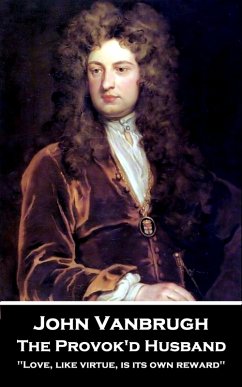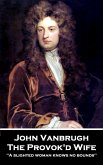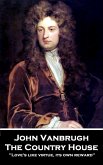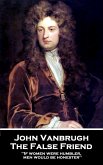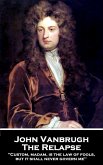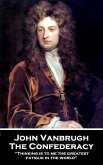Sir John Vanbrugh was born in London and baptised on 24th January 1664, the 4th of 19 children.
Vanbrugh was very political and soon came afoul of its machinations. He spent some time working undercover to help depose James II and bring about the Glorious Revolution of 1689 and the assumption of the throne by William of Orange It was on his return from bringing William messages at The Hague, that he was arrested at Calais on a charge of espionage in September 1688. Vanbrugh remained in prison in France for four and a half years.
After his release his career was to move in an entirely unexpected direction, and it would not be the last time.
London's theatre at this time was riven by a split among its only legitimate company: the United Company. Colley Cibber, who remained with the management, had written and performed in January 1696 'Love's Last Shift'. To Vanburgh's mind it demanded a sequel and who better to come up with that then himself.
His play, 'The Relapse, Or, Virtue in Danger', was offered to the United Company six weeks later. The play was a tremendous success that saved the company. Vanbrugh's second comedy, 'The Provok'd Wife', soon followed, this time performed by the rebel actors' company.
However, in the following few years he was to reinvent himself as an architect. Despite no formal training his inexperience was balanced by his unerring eye for perspective and detail and his close working relationship with Nicholas Hawksmoor, a former clerk of Sir Christopher Wren.
He is perhaps best known for his majestic masterpieces: Castle Howard (commissioned in 1699) and Blenheim Palace (commissioned in 1704).
Sir John Vanbrugh died suddenly from what was stated as 'an asthma' on 26th March 1726. He was buried in the church of St Stephen Walbrook in the City of London.
Vanbrugh was very political and soon came afoul of its machinations. He spent some time working undercover to help depose James II and bring about the Glorious Revolution of 1689 and the assumption of the throne by William of Orange It was on his return from bringing William messages at The Hague, that he was arrested at Calais on a charge of espionage in September 1688. Vanbrugh remained in prison in France for four and a half years.
After his release his career was to move in an entirely unexpected direction, and it would not be the last time.
London's theatre at this time was riven by a split among its only legitimate company: the United Company. Colley Cibber, who remained with the management, had written and performed in January 1696 'Love's Last Shift'. To Vanburgh's mind it demanded a sequel and who better to come up with that then himself.
His play, 'The Relapse, Or, Virtue in Danger', was offered to the United Company six weeks later. The play was a tremendous success that saved the company. Vanbrugh's second comedy, 'The Provok'd Wife', soon followed, this time performed by the rebel actors' company.
However, in the following few years he was to reinvent himself as an architect. Despite no formal training his inexperience was balanced by his unerring eye for perspective and detail and his close working relationship with Nicholas Hawksmoor, a former clerk of Sir Christopher Wren.
He is perhaps best known for his majestic masterpieces: Castle Howard (commissioned in 1699) and Blenheim Palace (commissioned in 1704).
Sir John Vanbrugh died suddenly from what was stated as 'an asthma' on 26th March 1726. He was buried in the church of St Stephen Walbrook in the City of London.
Dieser Download kann aus rechtlichen Gründen nur mit Rechnungsadresse in D ausgeliefert werden.

